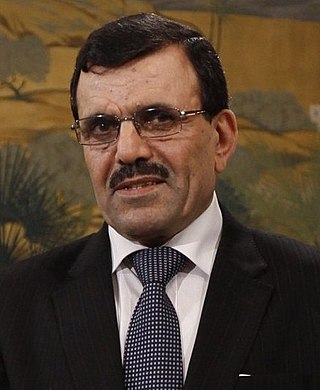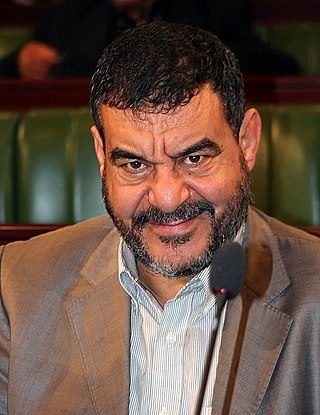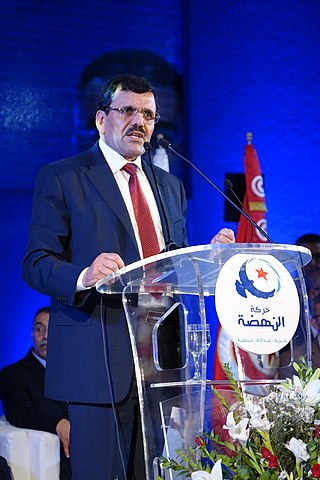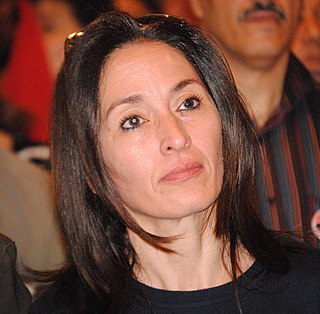| |||||
| Decades: | |||||
|---|---|---|---|---|---|
| See also: | |||||
The following lists events that happened during 2014 in the Tunisian Republic .
| |||||
| Decades: | |||||
|---|---|---|---|---|---|
| See also: | |||||
The following lists events that happened during 2014 in the Tunisian Republic .

The politics of Tunisia takes place within the framework of a unitary semi-presidential representative democratic republic, with a President serving as head of state, Prime Minister as head of government, a unicameral legislature and a court system influenced by French civil law. Between 1956 and 2011, Tunisia operated as a de facto one-party state, with politics dominated by the secular Constitutional Democratic Rally (RCD) under former Presidents Habib Bourguiba and then Zine el Abidine Ben Ali. However, in 2011 a national uprising led to the ousting of the President and the dismantling of the RCD, paving the way for a multi-party democracy. October 2014 saw the first democratic parliamentary elections since the 2011 revolution, resulting in a win by the secularist Nidaa Tounes party with 85 seats in the 217-member assembly.

The prime minister of Tunisia is the head of the executive branch of the government of Tunisia. The prime minister directs the executive branch along with the president and, together with the prime minister's cabinet, is accountable to the Assembly of the Representatives of the People, to the prime minister's political party and, ultimately, to the electorate for the policies and actions of the executive and the legislature.

The Constitution of Tunisia is the supreme law of the Tunisian Republic. The constitution is the framework for the organization of the Tunisian government and for the relationship of the federal government with the governorates, citizens, and all people within Tunisia. Tunisia's first modern constitution was the Fundamental Pact of 1857. This was followed by the Constitution of 1861, which was not replaced until after the departure of French administrators in 1956, by the constitution of 1959. It was adopted on 1 June 1959 and amended in 1999 and 2002, after the Tunisian constitutional referendum of 2002.

Presidential elections were held in Tunisia on 23 November 2014, a month after parliamentary elections. They were the first free and fair presidential elections since the country gained independence in 1956, and the first direct presidential elections after the Tunisian Revolution of 2011 and the adoption of a new Constitution in January 2014.

Habib Essid is a Tunisian politician who was Head of Government of Tunisia from 6 February 2015 to 27 August 2016. He was the first Head of Government to be appointed following the adoption of the new constitution and thus considered to be the first Head of Government of the Second Tunisian Republic. He previously served as Minister of the Interior in 2011.

Ali Laarayedh is a Tunisian politician who was Prime Minister of Tunisia from 2013 to 2014. Previously he served in the government as the Minister of the Interior from 2011 to 2013. Following the resignation of Prime Minister Hamadi Jebali, Laarayedh was designated as Prime Minister in February 2013. He is a member of the Ennahda Movement.

Mohamed Ben Salem, born on 19 February 1953, is a Tunisian politician. He served from December 2011 to January 2014 as Minister of Agriculture under the Prime Ministers Hamadi Jebali and Ali Laarayedh.

The first cabinet of Tunisian Head of Government Ali Laarayedh was presented on 8 March 2013. It was approved on 13 March 2013 by the Constituent Assembly of Tunisia. Laarayedh resigned on 9 January 2014. His successor, Mehdi Jomaa, took office on 29 January 2014.

Mehdi Jomaa is a Tunisian engineer and was the acting Prime Minister of Tunisia from 29 January 2014 to 6 February 2015. He was chosen on 14 December 2013. Jomaa was Minister of Industry in the Ali Laarayedh government.

Hakim Ben Hammouda is a Tunisian economist and was appointed the interim Finance Minister of Tunisia by the Prime Minister Mehdi Jomaa. He has previously worked with the African Development Bank.

The cabinet of Tunisian Head of Government Mehdi Jomaa was approved on 29 January 2014. The cabinet consists of 21 ministries and 7 secretaries of state.
A political crisis evolved in Tunisia following the assassination of leftist leader Mohamed Brahmi in late July 2013, during which the country's mainly secular opposition organized several protests against the ruling Troika alliance that was dominated by Rashid al-Ghannushi's Islamist Ennahda Movement. The events came as part of the aftermath of the Tunisian Revolution which ousted the country's longtime president Zine El Abidine Ben Ali, followed by a general election which saw Ennahda win a plurality alongside Moncef Marzouki's allied Congress for the Republic (CPR). The crisis gradually subsided when Prime Minister Ali Laarayedh resigned and a new constitution was adopted in January 2014.
On 16 July 2014, militants from the Uqba Ibn Nafi Battalion attacked two checkpoints in the Chaambi Mountains killing fourteen Tunisian soldiers and injuring twenty-five. The 2014 Chaambi Mountains attack is the deadliest militant skirmish involving the Tunisian Armed Forces since their independence in 1956.

Selma Hédia Mabrouk is a secular Tunisian politician who served on the 2011 Tunisian Constituent Assembly as a representative of Ettakatol party for the Ben Arous district. She made international headlines when she revealed that the initial draft of the constitution was attempting to define women as a "complement with the man in the family, and an associate to the man in the development of the country." The revelation was shocking to Tunisian society, where women had achieved rights unknown in the rest of the Arab world, and caused immediate outrage. Mabrouk's social media posts were instrumental in having those passages struck from the final constitution.

Kais Saied is a Tunisian politician, jurist and retired law professor currently serving as the 8th President of Tunisia since October 2019. He was president of the Tunisian Association of Constitutional Law from 1995 to 2019.

Ghazi Jeribi is a Tunisian politician. He served as Minister of Defence in the cabinet of Prime Minister Mehdi Jomaa. He also served as Minister of Justice in the cabinet of Prime Minister Youssef Chahed.
Hafedh Ben Sala is a Tunisian politician. He served as Minister of Justice in the cabinet of Prime Minister Mehdi Jomaa.
The following lists events that happened during 2013 in the Tunisian Republic.

The 2021 Tunisian self-coup took place on 25 July 2021, when Tunisian President Kais Saied dismissed the government of Hichem Mechichi, suspended the Assembly of the Representatives of the People and revoked the immunity of its members. Described as a self-coup, the move came after a period of political instability marked by a series of protests against the Ennahda-backed government and the collapse of the Tunisian healthcare system amidst the COVID-19 pandemic in the country.